Atiku Abubakar, the former Vice President of Nigeria, has condemned President Bola Tinubu’s foreign exchange policy, asserting that its hurried implementation without careful planning has led to multiple economic crises in the country.
Taking to his X (formerly Twitter account), Abubakar said the foreign exchange policy has caused different economic pain and poverty in the country.
According to the former vice president, the government did not allow the Central Bank of Nigeria (CBN) to develop and implement a sound FX management policy that would have dealt with such issues as increasing liquidity, regulating demands as well as rate convergence.
The PDP presidential candidate in the general election said that the current government should be willing to open itself to sound counsels from the opposition and ask for help in fixing the economy.
He said, “The Government did not allow the CBN the independence to design and implement a sound FX Management Policy that would have dealt with such issues as increasing liquidity, curtailing/regulating demand, dealing with FX backlogs and rate convergence.
“I firmly believe that if and when the Government is ready to open itself to sound counsels, as well as control internal bleedings occasioned by corruption and poorly negotiated foreign loans, the Nigerian economy would begin to find a footing again.”
Possible Solutions to fixing FX problems
Furthermore, the former vice president offered some possible solutions that can address the burgeoning foreign exchange crisis in the country.
READ ALSO: You’re ignorant of happenings around you, Atiku fires back at Onanuga
According to him, the government can implement a managed-float policy rather than a free-float FX regime.
He further stated that the government needs to bolster its foreign exchange reserve to promote liquidity in the market.
“Nigeria’s major challenge is the persistent FX illiquidity occasioned by limited foreign exchange inflows to the country. Without sufficient FX reserves, confidence in the Nigerian economy will remain low, and Naira will remain under pressure. The economy will have no firepower to support its currency.
“On the other hand, given Nigeria’s underlying economic conditions, adopting a floating exchange rate system would be an overkill. We would have encouraged the Central Bank of Nigeria to adopt a gradualist approach to FX management. A managed-floating system would have been a preferred option.
“In simple terms, in such a system, the Naira may fluctuate daily, but the CBN will step in to control and stabilize its value. Such control will be exercised judiciously and responsibly, especially to curb speculative activities,” Atiku advised.
President Bola Tinubu introduced a unified foreign exchange system last year July shortly after his inauguration, an attempt to put an end to multiple exchange rate windows and reduce arbitrage.
READ ALSO: Atiku berates Tinubu over order on NNPCL to submit receipts for crude oil sales to CBN
While the monetary policy has been able to reduce the premium gap between the official market and the parallel market, it has also resulted in over 100% devaluation of the Naira against the Dollar.
Nigeria’s external reserves have remained steady at $33 billion, despite World Bank projections suggesting a potential decline to $24 billion by the end of the year.
In the midst of these challenges, a significant observation was made by Yemi Cardoso during an interview on Arise TV two weeks ago. He highlighted that the stability of the Naira would depend on addressing the underlying economic issues such as inflation, economic growth, and increasing exports.
“The eventual stability of the Naira will be driven by our ability to address the fundamental issues affecting our economy…bring inflation under control and promote the growth of Nigerian businesses such that we eventually export much more than we consume as a nation,” he said.

 Health6 days ago
Health6 days ago
 Entertainment1 week ago
Entertainment1 week ago
 Crime7 days ago
Crime7 days ago
 Comments and Issues1 week ago
Comments and Issues1 week ago
 Latest1 week ago
Latest1 week ago
 Football1 week ago
Football1 week ago
 Comments and Issues1 week ago
Comments and Issues1 week ago
 Comments and Issues1 week ago
Comments and Issues1 week ago













